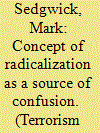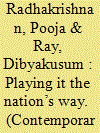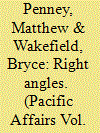| Srl | Item |
| 1 |
ID:
099654


|
|
|
|
|
| Publication |
2010.
|
| Summary/Abstract |
The ubiquity of use of the term "radicalization" suggests a consensus about its meaning, but this article shows through a review of a variety of definitions that no such consensus exists. The article then argues that use of the term is problematic not just for these reasons, but because it is used in three different contexts: the security context, the integration context, and the foreign-policy context. It is argued that each of these contexts has a different agenda, impacted in the case of the integration agenda by the rise of European "neo-nationalism," and so each uses the term "radical" to mean something different. The use of one term to denote at least three different concepts risks serious confusion. The proposed solution is to abandon the attempt to use "radicalization" as an absolute concept.
|
|
|
|
|
|
|
|
|
|
|
|
|
|
|
|
| 2 |
ID:
192858


|
|
|
|
|
| Summary/Abstract |
The generic popularity of Hindi sports films has been overwhelming in recent years. The article examines this genre of Hindi films through the thematic construction of the sports‘man’ and its evolutionary manifestation from a masculine figure symbolising India’s national unitarian ethos to a megalithic, tradition-backed, orthodox patriarchy post-2010s. It elaborates this seemingly linear transformation through decade based phases, starting from the social-emancipatory athletic phenomenon of the pre-globalisation era to the neoliberal Hindi sports films of the early millennial phase. The study then explores the slow dissolution of the ‘composite masculinity’ that considered the ethnic variegation of Indian nationalism, and the emergence of sporting cinema on patriarchal and athletic superheroes. The article further discusses how it was nurtured within deeply insular, and ethno-religious gaming traditions of antiquity like the akhara wrestling, in fictional/biographical sports films like Sultan (Zafar 2016) and Dangal (Tiwari 2016). While commenting on this transformation of the ‘national athlete’ into the ‘heritage’s surrogate’, the article attempts to provide a detailed methodology of understanding the expanding canon of Hindi sports films so far and how it aligns itself with the re-ethnicisation of India’s polity in the last two decades.
|
|
|
|
|
|
|
|
|
|
|
|
|
|
|
|
| 3 |
ID:
085879


|
|
|
|
|
| Publication |
2009.
|
| Summary/Abstract |
On 23 July 2007 a video short attached to an online article in the New York Times proclaimed " Japan is asserting itself militarily.It is embracing right-wing nationalism.
|
|
|
|
|
|
|
|
|
|
|
|
|
|
|
|